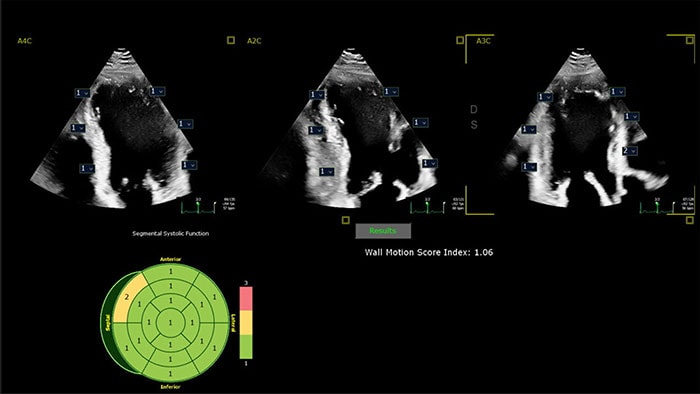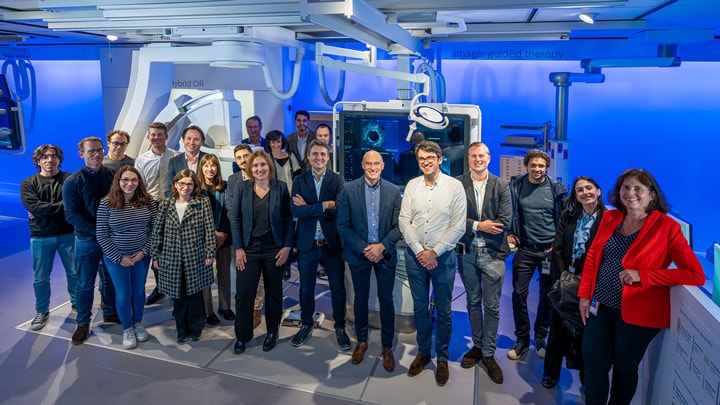Philips’ latest Future Health Index (FHI) 2021 report - the largest global survey analyzing healthcare leaders to discover how they are meeting today's demands and what the new reality of healthcare post-pandemic might look like - revealed that 40% of cardiology healthcare leaders surveyed are currently investing in the digital health technology artificial intelligence (AI). That puts them ahead of radiology healthcare leaders, another group that is set to benefit from AI, for which the corresponding figure was 29%.However, when asked about whether they anticipate investing in AI in three years, the figure increases to 71% for cardiology healthcare leaders. The average of healthcare leaders across the 14 countries surveyed was 74%. Cardiology healthcare leaders, like those surveyed across the 14 countries, are convinced that AI has an important role to play in current and future care.
Harnessing the predictive power of AI
Almost a third (29%) of cardiology healthcare leaders surveyed believe their hospital or healthcare facility needs to currently invest in predictive healthcare technologies to prepare for the future, compared to 17% of radiology healthcare leaders and 16% of informatics healthcare leaders. This may also offer some insights into why cardiology healthcare leaders are currently investing in AI, considered a predictive healthcare technology alongside machine learning. Could it be that they see the predictive power of AI as the only way to cope with the tsunami of heart disease that is occurring around the world, especially when sudden cardiac events are often fatal?
According to the World Health Organization (WHO), ischemic heart disease remains the world’s number-one cause of death [1] with a prevalence that is increasing year-on-year due to the aging population. The reasons why cardiology leaders are investing in AI today center mainly on increased operational efficiency, but three years from now they also expect to invest in AI to predict outcomes, provide clinical decision support, and integrate diagnostics.“
Cardiology is a data-driven specialty and the smart management of patients’ data, both in hospital and at home, is key to help improve outcomes and mitigate the burden of cardiovascular disease
Dr. Alexandra Goncalves
Cardiologist and Head of the Medical Office in Precision Diagnosis, Philips
Cardiology is a data-driven specialty and the smart management of patients’ data, both in hospital and at home, is key to help improve outcomes and mitigate the burden of cardiovascular disease,” said Dr. Alexandra Goncalves, Cardiologist and Head of the Medical Office in Precision Diagnosis at Philips.
Streaming the data on which AI can work its magic
Smart intelligence and AI capabilities are only effective if they can be seamlessly integrated into the data to deliver actionable insights that are readily accessible to the entire care team. This could explain why cardiology healthcare leaders’ expected longer-term digital health technology investment focus is on healthcare professional-to-patient telehealth technology.
Around three-quarters (71%) of the cardiology healthcare leaders surveyed said they are currently investing in some form of telehealth, with roughly the same proportion (79%) saying that their main priority today was responding to crises, including the fluid nature of the COVID-19 pandemic. This suggests that current telehealth spending is focused on keeping healthcare systems operational under difficult conditions.
When asked about their expected telehealth investment in three years, cardiology healthcare leaders did report a reduced level of investment over the next three years (71% currently to 48% in three years), but unlike their radiology and informatics counterparts they expect to invest an increasing proportion of it on healthcare professional-to-patient telehealth (43% vs. 24% informatics & 22% radiology). Radiology healthcare leaders and informatics healthcare leaders expect to spend a smaller proportion. So it appears that cardiology healthcare leaders see healthcare professional-to-patient telehealth as having additional long-term benefits.
“Interoperability, secure patient data sharing and data governance continue to be critical for the enabling of AI in cardiology. For heart patients, telehealth will be key to gathering streaming data, such as continuous ECG monitoring, where AI can be leveraged to help predict deteriorations before they become catastrophic events,” added Dr. Goncalves. “Telehealth solutions like Philips BioTel Heart and BioTel Care are already capable of continuously monitoring and managing cardiology patients in their own homes for up to 30 days after minimally-invasive interventions such as transcatheter aortic valve implantation (TAVI). Similar Internet-of-Things (IoT) devices will progressively increase the rich tapestry of data needed for highly personalized, predictive cardiac care.”
Optimistic about the future
In general, the Future Health Index 2021 report confirmed that the focus of virtually all healthcare leaders is currently on dealing with the COVID-19 pandemic and its associated fallout, and cardiology healthcare leaders are no exception. Almost three-quarters (73%) said the current crisis and pandemic needs was the external force most impeding their ability to prepare for the future. Nevertheless, 92% said they were confident their hospital or healthcare facility had shown resilience during the pandemic and 85% also said their national healthcare system had shown resilience. And they remained more optimistic than many of their colleagues about the future, with 41% very confident that their hospital or healthcare facility would be able to deliver quality care compared to the average of those across the 14 countries surveyed of 27%.
And when it comes to achieving the innovations needed to deliver that quality care, around two fifths (41%) expressed the opinion that if their hospital or healthcare facility prioritized strategic partnerships or collaborations with organizations such as health IT/informatics, B2B health technology, and consumer health technology companies, it would lead to the successful implementation of digital health technology solutions.
Visit the Philips Future Health Index site to download the full report. For more information on Philips’ cardiology solutions, join the Philips virtual experience at ESC 2021 or visit www.philips.com/cardiology to access Philips’ full suite of integrated imaging devices, software, informatics and services enhancing heart care.
















